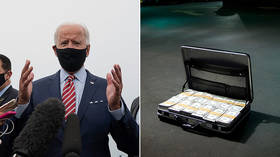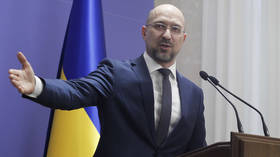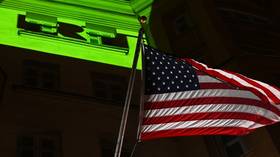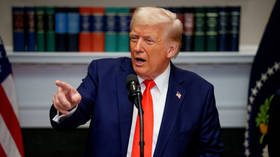Biden pledges funding transparency, yet seemingly cheats on own vows as many of his campaign donors are kept secret

As the sums received by Biden’s campaign have grown, his interactions with big donors have become more opaque, an NYT report shows, as part of a broader trend to ‘out’ the candidate’s non-commitment to his ‘transparency’ vows.
In May 2019, one week after launching his third presidential bid, Biden’s campaign vowed it would allow media access to all his fundraising events, saying it was reflective of his “longstanding commitment to transparency.”
The news was reported by Politico with some fanfare. The outlet explained it came in response to Democratic voters’ “increasing discomfort with the role of big-money donors in politics,” and allegations that Biden was “too cozy with corporate donors.”
It came at a time when candidates across the Democratic field were very publicly rejecting traditional fundraising practices – Massachusetts Senator Elizabeth Warren went furthest, declaring she wouldn’t even meet privately with any major donors, much less convene closed-door events with a group of them. Pete Buttigieg was the only runner to break with the shift, infamously hosting a convention with billionaires in a ‘wine cave’ in December 2019.
Biden’s pledge was no doubt well-received by US citizens – a November 2019 survey found 54 percent of Americans considered corruption in the US political system to be an extremely serious problem, more so than any other issue, including healthcare costs, climate change, illegal immigration and wage stagnation. In a 2015 poll, 85 percent said the country’s campaign finance system needs either “fundamental changes” or to be “completely rebuilt.”
Still, his longstanding commitment to transparency appears to have since evaporated. The New York Times reported on October 20 that in the last six months, Biden’s campaign has raised almost US$200 million from donors who gave at least $100,000.
The Pull Back
Once the primaries were over and Biden became the Democrats’ presumptive nominee, his donation limit “skyrocketed” from US$2,800 to over US$700,000 – and his campaign “pulled back” on its push for openness. Rather than allowing journalists to watch streams of virtual events with his biggest donors, handpicked reporters are only provided a call-in line, so they can’t see who’s in the audience.
The campaign has also declined to reveal the identities of its ‘bundlers’ – individuals who organize and collect campaign contributions from other donors. While little-discussed in the mainstream media, and little-known outside the Politico bubble, bundlers play a hugely significant role in US campaign financing. Furthermore, many go on to receive presidential appointments, government contracts, opportunities to influence agency decisions and other lofty rewards if their candidate wins the race.
Also on rt.com ‘Being a Trump supporter is being a bad person,’ Google manager tells Project Veritas in new revelations of bias in tech giantBundlers are frequently bunched under different “tiers” according to how much they’ve raised, which introduces a competitive element to the process.
Biden’s campaign is no different – the highest tier, “Biden Victory Partner,” is set at $2.5 million, according to the New York Times. More modest tiers include “Protector” ($50,000), “Unifier” ($100,000), “Scranton Circle” ($250,000), “Philly Founder” ($500,000) and “Delaware League” ($1 million).
The identities of these check-collectors have only been disclosed once, in late December 2019 when 235 people who’d raised at least $25,000 were named. The campaign has raked in over $1.2 billion since. In 2008, Hillary Clinton's $100,000 bundlers were dubbed “HillRaisers” and she regularly released lists of their identities, as she also did in 2016.
Corporate Welfare
Previous reports have shown that Biden’s campaign has been offering major donors exclusive summits with his policy advisers, some of which are entirely close-door. One might reasonably guess the kind of individual who’d be in attendance, depending on the adviser. For example, Bruce Reed, a chief of staff for Biden when he was vice president, held a closed-door seminar titled “the future of energy.” Executives from the sector’s biggest firms would surely be extremely interested to learn from a potential future regulator what plans they have for the industry.
In September 2019, Biden’s campaign announced it would no longer accept money from lobbyists or corporate political action committees (PACs), and said it intended to return any and all funds it had hitherto received from such sources. This policy has remained intact ever since – but no such rule governs donations to the Democratic National Committee, and, as Politico first reported, Biden’s advisers have appeared at virtual fundraising events organized by lobbying firms, including Steve Ricchetti, Biden’s campaign chair - himself a former lobbyist.
Also on rt.com Hunter Biden email story successfully strangled by Facebook, but Twitter’s ham-handed censorship BACKFIRED – researchBy contrast, President Donald Trump has kept fundraisers with big contributors entirely behind closed doors - including some events held at his own businesses, from which he simultaneously personally profits. His own bundlers have been kept nameless in 2020, as they were in 2016. Despite repeatedly claiming during that campaign he was so rich he couldn’t be bought, for his reelection Trump has relied heavily on donations from large corporate interests and extremely wealthy individuals - although 52.9 percent of his total donations ($251,986,727) has flowed from “small donors,” compared to 38.36 percent of Biden’s ($203,671,028).
A review of which sectors are giving which candidate more money is a handy guide to who best represents their interests. For instance, according to OpenSecrets, a research group tracking money in politics, energy companies overwhelmingly back Trump, having collectively donated $15,551,429 to his campaign, versus $3,710,175 to Biden - no doubt a reflection of the latter making the battle against climate change a key election issue, and making various vague pledges in respect of fossil fuels and fracking.
Healthcare providers also seem to favour Trump, with its constituent companies pledging $54,150,840 to the president, and $31,977,731 for Biden. During the 2016 campaign, Trump repeatedly vowed to repeal ‘Obamacare’, the Affordable Care Act. Biden was instrumental in its passage into law. Efforts by House Republicans to achieve its repeal have been ongoing ever since Trump’s election victory. The Supreme Court is scheduled to hear oral arguments against the Act just after the November vote, in a case brought by a coalition of Republican state attorneys general and the Trump administration, which argues the law is unconstitutional.
Tech giants, including Google’s parent company Alphabet, Amazon, Apple, Disney, Microsoft and IBM have given Biden $43,471,709, but Trump only $5,707,650.
The finance sector has given Biden $101,015,180, and Trump $59,935,983. A surprising development indeed, given the industry - which is far and away the largest source of campaign contributions to candidates and parties in the US - has, since 2010, overwhelmingly favoured Republicans. Democrats have been central to the passing of key post-financial crisis legislation, such as the Dodd-Frank Act, which protects consumers from predatory lending practices, and prevents banks from engaging in dangerous, high-risk operations.
Nonetheless, the casino industry clearly backs Trump, providing him with $38,058,934 in funding, and Biden a paltry $903,537. The president himself at one point owned a chain of casinos in Atlantic City, New Jersey, under the imprint of Trump Entertainment Resorts Inc, and between 1991 and 2014, the company filed for Chapter 11 bankruptcy on four separate occasions. One of his casinos broke anti-money laundering rules 106 times in its first year and a half of operation in the early 1990s.
The defense industry seems to be hedging its bets however, with Biden receiving $1,374,678, Trump $1,192,981 - indeed, most firms in the industry have given roughly the same amount to both parties over the past year, with Lockheed Martin ($4,049,034) and Northrop Grumman ($3,826,835) pledging the most overall.
Like this story? Share it with a friend!













